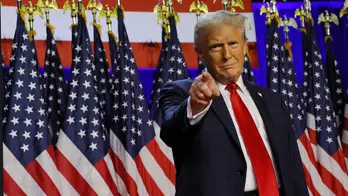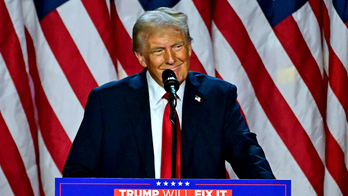Republicans propose bill that would double tariffs on Chinese imports and end favored trade status
FIRST ON FOX: A group of Republican senators is unveiling a new bill that would cease all permanent normal trade relations with China and double the tariffs on Chinese Communist Party (CCP) goods.
The bill would, over five years, increase tariffs by 100% on imports deemed "strategic" to national security by the Biden administration in an effort to force the growth of the domestic market for national security-related goods.
It would boost tariffs on non-strategic goods by a minimum of 35%.
The bill, led by Sen. Tom Cotton, R-Ark., and cosponsored by Sens. Marco Rubio, R-Fla., and Josh Hawley, R-Mo., would also grant the president the authority to institute further tariffs, quotas and bans on specific Chinese goods. It would end "de minimis treatment" for China, or the value threshold below which imports are not subject to customs duties.
The revenue generated from this, according to the bill, would go towards farmers and manufacturers injured by potential Chinese retaliation, the purchase of key munitions important to a Pacific conflict, and paying down the debt.

A group of Republican senators is unveiling a new bill that would cease all permanent normal trade relations with China and double the tariffs on Chinese Communist Party (CCP) goods. ((Photo by Xie Huanchi/Xinhua via Getty Images))
GOP SENATORS EYE COMPREHENSIVE STRATEGY TO CURB CCP INFLUENCE
"This comprehensive repeal of China’s PNTR [Permanent normal Trade Relations] status and reform of the U.S.-China trade relationship will protect American workers, enhance our national security, and end the Chinese Communists’ leverage over our economy," Cotton said in a statement.
"Giving Communist China the same trade benefits that we give to our greatest allies was one of the most catastrophic decisions that our country has ever made," said Rubio.
Economists forecast that China’s GDP is expected to grow by nearly 5% in 2024. The U.S.’s forecasted GDP growth is half that.
The legislation falls in line with one of Trump's top priorities: during the presidential debate this month, the former president said again that he would impose a 60% tariff on Chinese goods and a 10% baseline tariff on all imported goods. Vice President Kamala Harris scoffed at that plan as a "a sales tax on the American people."
Earlier this month, China instituted new export controls on a batch of minerals that are critical to the U.S. defense industry, including antimony products.

Sen. Tom Cotton, R-Ark., author of the bill, said it would "protect American workers, enhance our national security, and end the Chinese Communists’ leverage over our economy"

The legislation falls in line with one of Trump's top priorities: during the presidential debate this month, the former president said again he would impose a 60 percent tariff on Chinese goods. (Al Drago/Bloomberg via Getty Images)
The little-known flame-retardant metal is used in ammunition, infrared missiles, nuclear weapons and night vision goggles, as well as batteries and photovoltaic equipment. China produced nearly half of the world’s antimony last year.
BIDEN ROLLS OUT NEW CHINA TARIFFS
In 2000, the U.S. Congress voted to grant China permanent normal trade relations. The designation fundamentally changed China-U.S. trade relations: American consumers gained access to low-priced Chinese imports and between 2001 and 2021, the value of goods imported from China quadrupled to $500 billion.
"More than two decades ago, Washington elites granted China most favored nation trading status, enabling Beijing to exploit our working class. Congress must revoke this sweetheart deal to protect American workers from our greatest adversary and to bring back the millions of manufacturing jobs shipped overseas," said Hawley.
The Biden administration earlier this month finalized plans to increase tariffs on certain Chinese-made products: the tariff rate would double for electric vehicles, go up 50% on solar cells and 25% on EV batteries, critical minerals, steel, aluminum, face masks and ship-to-shore cranes beginning September 27, according to the Office of the U.S. Trade Representative.
Tariff hikes on other products, like semiconductor chips, are expected to go up over the next two years.
CLICK HERE TO GET THE FOX NEWS APP
Trump implemented sweeping tariffs on about $300 billion worth of Chinese-made products. Biden kept those in place and slapped more tariffs on about $15 billion of Chinese imports.
China is widely expected to respond with tariffs on U.S.-made goods.
Disclaimer: The copyright of this article belongs to the original author. Reposting this article is solely for the purpose of information dissemination and does not constitute any investment advice. If there is any infringement, please contact us immediately. We will make corrections or deletions as necessary. Thank you.







